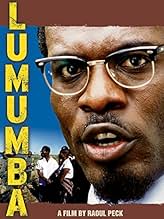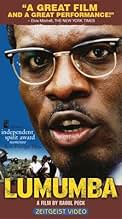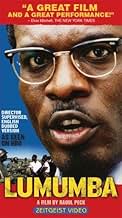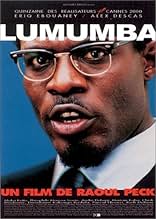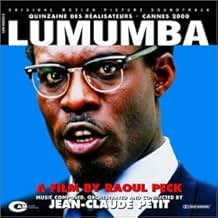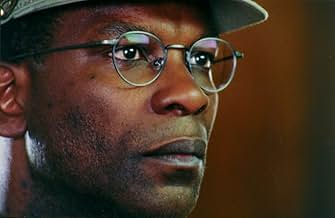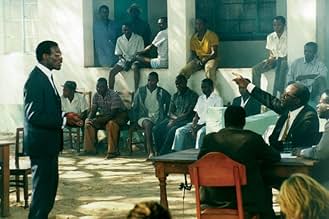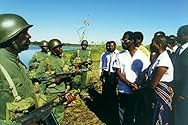IMDb RATING
7.2/10
2.1K
YOUR RATING
The true story of controversial leader of independent Congo Patrice Lumumba.The true story of controversial leader of independent Congo Patrice Lumumba.The true story of controversial leader of independent Congo Patrice Lumumba.
- Awards
- 3 wins & 8 nominations
Théophile Sowié
- Maurice Mpolo
- (as Théophile Moussa Sowie)
Makena Diop
- Thomas Kanza
- (as Oumar Diop Makena)
Dieudonné Kabongo
- Godefroid Munungo
- (as Dieudonné Kabongo Bashila)
Pascal N'Zonzi
- Moïse Tshombe
- (as Pascal Nzonzi)
- Director
- Writers
- All cast & crew
- Production, box office & more at IMDbPro
Storyline
Did you know
- TriviaRaoul Peck had already made a film about Lumumba in 1992: the documentary "Lumumba, la mort du prophète".
- GoofsWhen Lumumba arrives at Brussels airport for a round table conference, an Airbus A300 and Lockheed C-141 Starlifter can clearly be seen. Both of these aircraft had not yet entered into service and flown at the time the event took place in 1960. Airbus A300 made its first flight on 28 October 1972, twelve years later; and Lockheed C-141 Starlifter made its first flight on 17 December 1963, three years after the conference.
- Quotes
[first lines]
Patrice Émery Lumumba: [voice over narration] You never knew about that night in Katanga. No one was to know.
- Alternate versionsFrank Carlucci, who was second secretary at the U.S. embassy in the Congo at the time of Lumumba's assassination, is portrayed in one scene discussing the murder with U.S. Ambassador Clare Timberlake and several Belgian and Congolese officials. Carlucci threatened to sue U.S. distributor Zeitgeist Films if his name was not removed from the movie. Zeitgeist was too small to fight any potential lawsuit, so all non-theatrical U.S. releases of the film (including the version shown on HBO and potential VHS and DVD releases) have Carlucci's name bleeped from the dialogue and masked in the closing credits.
- ConnectionsFeatured in Exterminate All the Brutes: Who the F*** is Columbus? (2021)
Featured review
I liked this film but to like it, you must know more about the history of Congo. You must also know some more about Belgians and their disrespect (and that is a metaphore!) of the Congolese state.
Lumumba and the Congolese people didn't deserve this as he was right. We Belgians did exploit them for decades. But just because Lumumba reacted not so friendly to Bwana Kitoko (the king was called this way by the Congolese in a previous visit, he was hailed as a great leader) they had to further destabilize Congo and assassinate Lumumba. So he called for the help of the USSR, that was his only option as everybody else was against him. For the Congolese people the US didn't do anything like they did for us with the Marshall Plan. They did support Mobutu's cruel dictatorial rule with lots of money. What good did that do for the average Congolese?
And the trouble didn't stop with the flight of Mubutu. In modern sociological terms, Congo is considered a failed state. And that has it's reasons (and we Belgians are responsible for a large part of those). I hope that Lumuba's dream will still come true and that the Congolese peace process will last so peace and a way of living that is accepted by all Congolese may finally come for them.
Back to the film: You can't expect to understand the complex situation the new independent Congo was put in just by watching this film. That's like thinking the film Enemy at the Gates will explain me everything about the battle of Stalingrad. The film is restricted in many ways and the viewer must understand that. first: It's a film, not a documentary. Some of the scenes are interpretations but they are needed for the plot. second: The main character is Lumumba. Not everything about the troubles in Katanga or elsewhere is told, neither is everything about Mobutu told. It would have been an endless film that way. third: The film is an African film, let them create their own ways of telling this story. White people shouldn't tell them how to tell a story. But I'm glad that some funded this film that tell some people more about an unclear history. It might encourage them to find out more about Lumumba or various other things after the credits roll away and that is a good thing.
Lumumba and the Congolese people didn't deserve this as he was right. We Belgians did exploit them for decades. But just because Lumumba reacted not so friendly to Bwana Kitoko (the king was called this way by the Congolese in a previous visit, he was hailed as a great leader) they had to further destabilize Congo and assassinate Lumumba. So he called for the help of the USSR, that was his only option as everybody else was against him. For the Congolese people the US didn't do anything like they did for us with the Marshall Plan. They did support Mobutu's cruel dictatorial rule with lots of money. What good did that do for the average Congolese?
And the trouble didn't stop with the flight of Mubutu. In modern sociological terms, Congo is considered a failed state. And that has it's reasons (and we Belgians are responsible for a large part of those). I hope that Lumuba's dream will still come true and that the Congolese peace process will last so peace and a way of living that is accepted by all Congolese may finally come for them.
Back to the film: You can't expect to understand the complex situation the new independent Congo was put in just by watching this film. That's like thinking the film Enemy at the Gates will explain me everything about the battle of Stalingrad. The film is restricted in many ways and the viewer must understand that. first: It's a film, not a documentary. Some of the scenes are interpretations but they are needed for the plot. second: The main character is Lumumba. Not everything about the troubles in Katanga or elsewhere is told, neither is everything about Mobutu told. It would have been an endless film that way. third: The film is an African film, let them create their own ways of telling this story. White people shouldn't tell them how to tell a story. But I'm glad that some funded this film that tell some people more about an unclear history. It might encourage them to find out more about Lumumba or various other things after the credits roll away and that is a good thing.
- How long is Lumumba?Powered by Alexa
Details
Box office
- Gross US & Canada
- $352,296
- Gross worldwide
- $352,296
- Runtime1 hour 55 minutes
- Sound mix
Contribute to this page
Suggest an edit or add missing content



